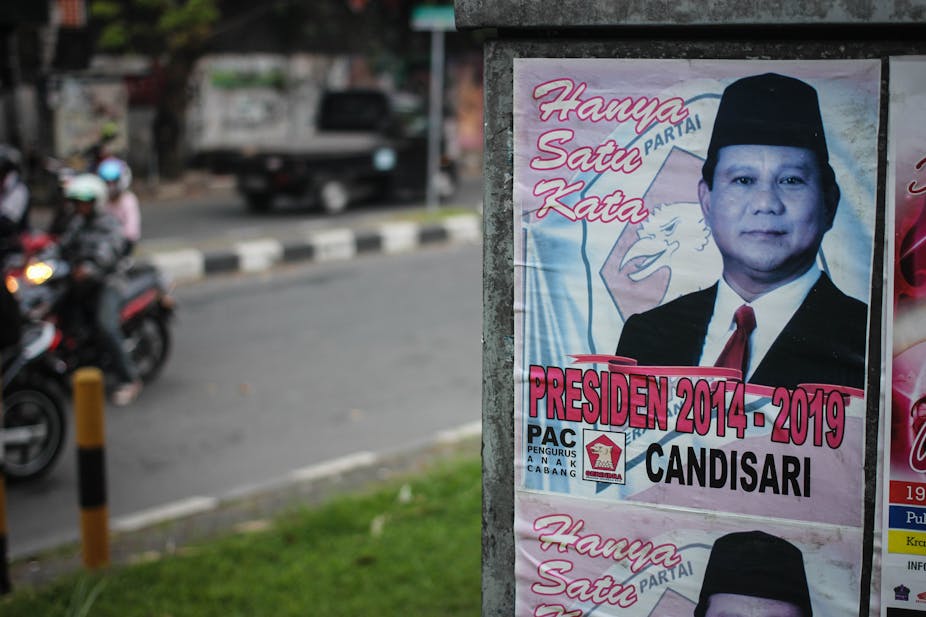On July 9, Indonesians will elect their 7th president from two candidates of very different styles.
Jakarta governor Joko Widodo, better known as Jokowi, presents himself as a humble man of the people. His rival, former special forces chief Prabowo Subianto, styles himself as a decisive man who can restore Indonesia to its greatness.
Jokowi has been leading the polls in the presidential race. But lately Prabowo is closing the gap.
Some educated urban Indonesians dread of a violent authoritarian regime should Prabowo be elected. The once son-in-law of Indonesia’s former dictator Suharto has a reputation of committing atrocities. He is thought to be one of the most violent generals during Suharto’s rule, a reputation he does not entirely deny.
Prabowo’s actions against the populace in East Timor, Aceh and against student activists apparently exceeded the Army’s own broad and very flexible limits. He managed to avoid trial in Indonesia, but is banned from entering the United States.
Despite this notoriety, many see Prabowo having significant legitimacy. He has support within Indonesia’s political elite; various major political parties (PKS, PAN, PPP, Golkar); many academics ; the incumbent president, SBY; some Catholic organisations; and a women’s group.
Contradictions in his campaign are difficult to reconcile. One of the student activists whom Prabowo was alleged to have abducted is now a supporter of Prabowo’s party. And this is not merely a personal idiosyncrasy. During military crackdowns in Aceh, Prabowo was thought to have been exceptionally ferocious. Yet the party which represents the cause of the “rebels” in Aceh now supports Prabowo in his election campaign).
So what is the appeal? The very thing that causes some Indonesians concern – Prabowo’s brutal reputation – is actually part of the attraction for his supporters.
The way Prabowo presents himself ticks a number of important cultural boxes. First, his claim to Javanese aristocratic heritage is probably intended to create a sense of legitimacy, especially among Indonesia’s most numerous ethnic group, the Javanese.
Second, Prabowo presents himself as an aggressive nationalist. His fiery speeches, safari suits, even 1950s style microphone recall the father of Indonesia’s independence Sukarno, promising with typical nostalgic accuracy a great revival of Indonesia.
This aggressive nationalism is backed up by his conspicuous use of symbolism, including the national colours (red and white) and heraldry (the Garuda, a mythical bird-like creature).
Prabowo’s authoritarian penchant is also a source of popularity. An undercurrent in Indonesian nationalism has never accepted a nation of citizens represented by a parliamentary democracy. Rather, the nation is thought of as being an organic whole, like a family under the benevolent guidance of a father (the state). This thinking shares an intellectual heritage with European fascism and with pre-modern and early modern Javanese ideas of power. It still resonates today.
Most importantly Prabowo’s violent reputation, rather than counting against him, may be a source of popularity.
We could consider this in relation to human rights. In many Western cultures human rights are thought of as a set of sacred principles. To infringe upon a human right is a grievous crime.
You can see evidence of this kind of thinking in Indonesian popular culture. However, in addition, human rights have another meaning. They are merely impediments to the State, which, rightly or wrongly, stop the State doing its job properly. If the army stopped itself from cracking down on separatist rebels for fear of being accused of human rights infringements, this is considered a bad thing. Human rights just get in the way of the State’s proper functioning.
The acceptance of violence also comes through in the figure of the “petty gangster” (preman). Throughout Indonesia you can find petty gangsters standing over stall owners, hanging around nightclubs demanding fees for parking, lurking on university campuses, and joining paramilitary organisations.
Many Indonesians will openly denounce the prevalence of these “tough men”. However, there is also a widespread perception that, if everyone else has them to protect themselves, you need preman for protection too. In politics, you need tough guys to support your cause, even at the very top.
Lastly, in Indonesia, state violence is appreciated and even applauded in many contexts. For instance, marching is still a popular pastime and supporters of all the major political parties form quasi-military wings.
In a recent interview, respected Indonesian political analyst Wimar Witoelar ascribed Prabowo’s popularity to his deep pockets and media alliances. He stated that Prabowo will soon run out of money and disappear from the political arena. This is understandable but wishful thinking. Prabowo has oodles of cash.
The former special forces general may or may not win the election to be the president of the world’s fourth largest nation this time. But even if he doesn’t, it appears as though Prabowo will continue to be a major force in politics.

